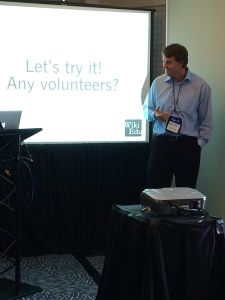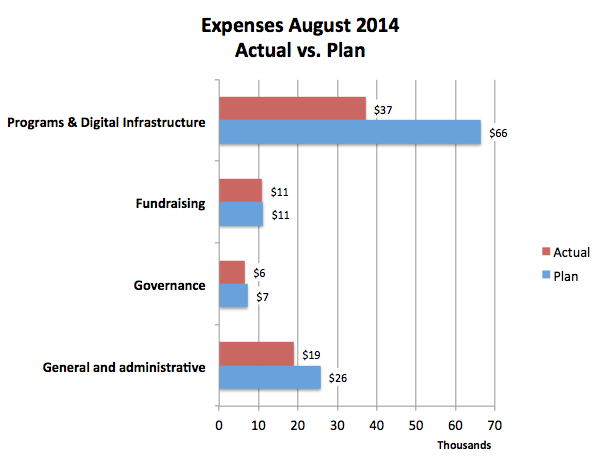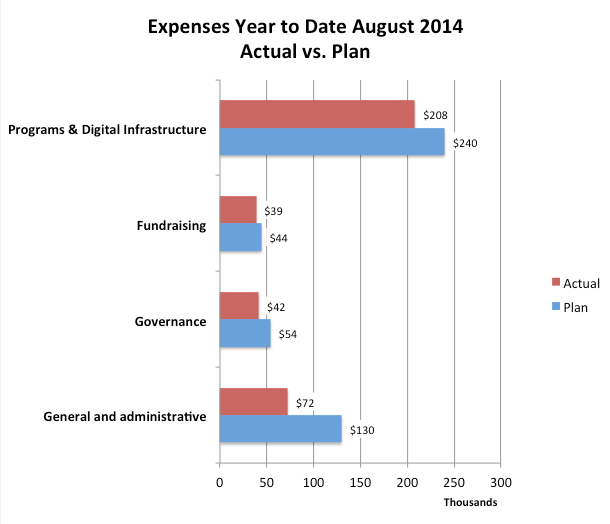1. Highlights
- Frank Schulenburg, Sara Crouse, Jami Mathewson, and LiAnna Davis, and board members Diana Strassmann, Karen Twitchell, and Richard Knipel all traveled to London for Wikimania 2014. Wiki Ed played a major role in the Future of Education track at Wikimania. Jami and LiAnna led three Education Pre-Conference workshops and presented in four official program sessions; Diana gave one of the Wikimania keynotes.
- The first discipline-specific handout for student editors was released this month, covering how to edit psychology articles. This series of handouts is designed to supplement the Editing Wikipedia brochure for student editors with specific information about sourcing requirements, policies, and structure for articles in disciplines our students edit content in.
- After vetting a number of excellent proposals, we’ve selected Seattle-based digital creative company WINTR to work with us on our first major technology project. Sage Ross will work with WINTR during September and October to create the Assignment Design Wizard – a tool to help instructors create great Wikipedia assignments without doing everything from scratch.
2. Programs
Wikimania
Frank Schulenburg, Sara Crouse, Jami Mathewson, and LiAnna Davis, and board members Diana Strassmann, Karen Twitchell, and Richard Knipel all traveled to London for Wikimania 2014. Wiki Ed played a major role in the Future of Education track at Wikimania. Jami presented in two Education Pre-Conference sessions, one on training new Wikipedia Ambassadors, and one on structuring new education programs. LiAnna led a half-day workshop for educators from around the world on how to use Wikipedia as a teaching tool. As part of the main conference, Frank, LiAnna, and Jami presented a session called “Ask the Wiki Education Foundation,” while LiAnna co-presented on the Wikipedia Education Collaborative and presented a solo session on “The 7 Biggest Mistakes the Wikipedia Education Program’s Made – and What We’ve Learned From Them.” Jami co-presented in a session called “Wikipedia Education Program By the Numbers” about how we use metrics to measure success. For more information on our Wikimania experiences, see our wrap-up blog post.
Hiring
The Programs Department wrapped up hiring for two open positions: Helaine Blumenthal will join the team as Classroom Program Manager and Eryk Salvaggio as Communications Associate. Helaine and Eryk will both start their new roles at the end of September. We also opened two half-time roles for Wikipedia Content Experts, one in the Humanities and one in the Sciences. Experienced Wikipedia content writers looking for work are encouraged to check out these opportunities.
2.1. Educational Partnerships
We are starting to focus our attention and resources on the sustainability of the Classroom Program. One strategy for expanding our support is to recruit new instructors and courses through academic associations, making it easier to provide subject-specific course materials and to recruit experts to identify content gaps on Wikipedia.

The American Sociological Association is one such academic association that has a Wikipedia Initiative, driving their instructor members to help improve the sociology content on Wikipedia, in part through our program. In August, LiAnna and Jami presented at ASA’s Annual Meeting in San Francisco. Anne Kingsley, an instructor in the Classroom Program, also participated to highlight her motivations, experience, and learning outcomes from using Wikipedia as a teaching tool. The presentation focused on designing Wikipedia assignments that meet both instructors’ and Wikipedia’s needs. One instructor, Dr. Ben Waddell of Adams State University, volunteered to workshop a sociology assignment for the coming fall term in front of the group.
2.2. Classroom Program
A discipline-specific handout designed to help student editors was released this month. Editing Wikipedia articles on Psychology is the first in a series of handouts the Wiki Education Foundation will be producing that aim to provide student editors in the Classroom Program more details on how to write articles for specific disciplines. We began with psychology, since additional sourcing requirements have been a challenge for some student editors in the past. We extend a special thank-you to Wikipedia editors and psychology professors who provided valuable feedback on drafts of this brochure during the editing process.
Current status of the Classroom Program (fall term 2014) in numbers, as of August 31st:
- Status: The fall 2014 term has started at several universities in the United States and Canada.
- 42 Wiki Ed-supported courses have Course Pages (21 or 50% are led by returning instructors)
- 300 student editors are enrolled
- 135 student editors have completed the online training for students
2.3. Digital Infrastructure
The beginning of August marked the due date for proposals for building Wiki Ed’s first major technology project, the Assignment Design Wizard. The idea itself — a way for instructors to design and customize their own Wikipedia classroom assignment, while learning about the best practices we’ve identified over the years, and without dealing with wiki markup or rigid boilerplate text — generated a lot of excitement from developers, as did our broader vision of bringing together the worlds of academia and Wikipedia. We received a very strong set of proposals from development companies small and large, but ultimately one stood out: WINTR. With a history of developing beautiful interactive web experiences for major brands, a strong desire to do work that matters, and a development philosophy that puts user experience at the center, WINTR has everything we were hoping to find in a technical partner. WINTR is based in Seattle, Washington, giving Product Manager Sage Ross the opportunity to collaborate with them in person during the Assignment Design Wizard project. We’re planning to get started with development in mid-September, and to have the first iteration of the Assignment Design Wizard up and running on our website by late October.
3. Financials
- Expenses for the month is $73,576 versus plan of $110,635, primarily due to later than anticipated signing and start-up of WINTR beginning work on the Assignment Design Wizard.
- Year-to-date expenses is $363,294 versus plan of $462,861, primarily due to the continued delays in moving into our office space.
- Cash position is $104,813 as of August 31, 2014.


4. Board
The board welcomes a new member, Lorraine Hariton. She brings more than 25 years of experience in the technology industry, including serving as the CEO of two companies, Beatnik and Apptera. Hariton received her B.S. in Mathematical Sciences from Stanford and her MBA from Harvard Business School. Her career includes thin-client computing, smart grid and street lighting controls, retail payment systems, Internet audio solutions, and speech applications. She spent five years as the Special Representative for Commercial and Business Affairs at the US Department of State. In this role, she led initiatives for the global business community, including the Ambassador’s Direct Line Program and the Global Entrepreneurship Program. She is currently Senior Advisor for Global Partnerships at the Transnational Strategy Group.
In other board news, Karen George was elected secretary, following last month’s resignation of former secretary Mike Christie.
5. Office of the ED
- Current priorities:
- Moving into new office space
- Organizational development: expansion of programmatic and administrative capacity
- Finalizing annual plan & budget
- In August, we finalized the lease negotiations with the Presidio Trust, which manages the park in partnership with the National Park Service. As we were under a heavy workload this month and needed to coordinate things very closely, we worked half of the month out of a conference room at the Inn at the Presidio, which is only a few minutes up the street from our new office. Beginning in early September, Wiki Education Foundation will be located at 11 Funston Avenue, Suite A, at the heart of San Francisco’s Presidio. We started ordering furniture and office equipment for our new home. Everybody on staff is excited about working out of the Presidio, and some people already started exploring the surroundings (including the somewhat inevitable writing of encyclopedia articles about the fauna, flora, and history of the Presidio).
- Also in August, Bill Gong started as our new Director of Finance and Administration. In his new role, he will help us build a stable infrastructure for operations and finance in a growing organization and ensure that our resources are being put to the most productive use. Bill comes to us with lots of experience and a career primarily focused on non-profit work, as he really enjoys working in organizations that fulfill mission-related work.
- Quarterly reviews for Sage’s work in Digital Infrastructure and Jami’s efforts for the Classroom Program took place on August 22 and 29, respectively. Notes and slides from these reviews will be posted soon.
6. Media
News coverage:
- Wikipedia: The future of learning?, BBC “In the Balance”, August 9, 2014. (Radio interview with Wiki Ed Board Chair Diana Strassmann)
Press releases:
- Lorraine Hariton elected to Wiki Education Foundation board (August 18, 2014)
